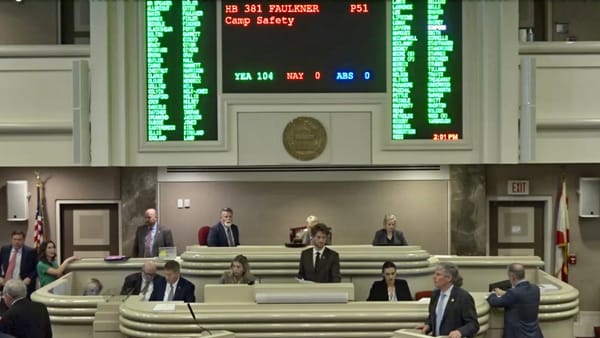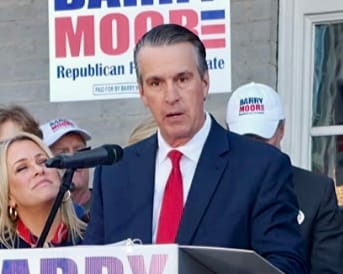As shutdown forces layoffs, Alabama delegation urges reopening—not firings
As Democrats push back against initial cuts, others propose using the shutdown to drastically cut government, eliminate deficit, and defund the Left

As the federal shutdown stretches into its second week, the White House has signaled tougher action: layoff notices tied to the funding lapse are being sent to thousands of federal workers, and officials say deeper cuts are likely if the stalemate continues.
Despite a “clean CR,” passed by the House to extend Biden-level spending for another seven weeks, to allow negotiations to continue, Senate Democrats continue to insist on massive increases in spending before they will allow the government to reopen.
Vice President J.D. Vance told Fox News the cuts will grow the longer the shutdown lasts, and called the moves “painful,” while the Office of Management and Budget (OMB) said more than 4,000 employees could soon lose their jobs. Agencies including Education, Homeland Security, Treasury and HHS have begun issuing notices as leaders weigh which roles to preserve during the lapse.
Alabama’s congressional delegation pushed one clear line this week: end the shutdown and reopen the government. Senator Tommy Tuberville said Republicans are working to pass a conservative funding plan that keeps key services running, and argued federal spending should be scaled back and returned to states where possible. “We have got to be more progressive in fighting back against the money being spent by the federal government,” he said.
Sen. Katie Britt pressed a similar theme and asked the Senate’s financial clerk to withhold her pay while the shutdown persists—a symbolic rebuke to what she called the “Schumer Shutdown.” Britt said she stands with service members and federal workers affected by the lapse, and urged colleagues to act to restore funding. Representatives Barry Moore (R-AL1) and Dale Strong (R-AL5) have done the same.
Iowa Republican Sen. Joni Ernst—though not part of Alabama’s delegation—laid out a forceful fiscal case this month, sending OMB a menu of policy choices she said could yield as much as $2 trillion in long-term cuts. Her letter frames the administration’s broader aim: use this pause to reduce “wasteful federal spending” and trim programs she and other conservatives view as duplicative. The Ernst plan has become part of the public debate over which programs the administration might target now or later.
Among Ernst’s proposals: rescinding unspent and expired COVID-19 funds, canceling so-called “slush funds,” consolidating and selling underused federal buildings, ending a beleaguered EV charging program, closing purchase card accounts tied to former employees, and eliminating “silly science” grants. She also presses to reclassify “non-essential” federal employees, arguing taxpayers should not subsidize idle federal roles costing roughly $400 million per day.
Sen. Ernst isn’t alone in proposing to use the shutdown to drastically cut the federal leviathan. Dr. Peter St. Onge suggested doing something similar on September 29, just before the shutdown began:
“Trump alone gets to decide which parts are essential and therefore stay open. So, keep the parks, keep the school lunches, fire the rest. In practice that would be at least a third of the federal government shut down—the parts voters don't like—then keep paying the essentials with incoming tax revenue. Now, this is not necessarily legal, but Democrats are not stupid enough to block Social Security checks and military pay for potentially months. So if they had a pair, Republicans in Congress would shut it down for years. This is fun for a number of reasons. First, shutting down a third of the federal government saves $200 billion per month. That would instantly balance the budget. In fact, we'd be in surplus. Even better, a durable shutdown lays off 740,000 federal workers, about four times what they did with DOGE. Federal grants also pay an estimated 3 million employees of overwhelmingly left wing NGOs—those would all be gone. In other words, a real shutdown would wipe out the progressive revolution. They'd be down to brainwashed college students.”
It’s highly doubtful that a strategy such as proposed by Sen. Ernst and Professor St. Onge will be implemented because, as St. Onge said, Republicans “always wimp out.” Also, lawsuits have already been filed to block the layoffs by federal worker unions, and more suits would inevitably follow any such comprehensive federal reduction strategies—no matter how popular those layoffs would be with the President's base.
The pushback against the announced cuts, while relatively minor, is already in full swing. Labor groups and Democrats say the planned firings go beyond normal shutdown practice and are illegal. Democratic leaders have accused the administration of punishing rank-and-file workers for a political fight. The White House counters that it is protecting the military and critical social services while being forced to choose which employees to keep on the payroll.
Alabama’s leaders want a simple fix—Congress should reopen the government, stop the pain for workers and do the hard work of budgeting later. That message fits what they perceive as the local political mood: voters and their representatives want services to run and paychecks to come on time.
For many voters—those who believe the $37 trillion dollar debt and the out-of-control spending that caused it are a significant threat to the nation—the modest cuts the administration and “Republican-controlled” Congress will allow represent a lost opportunity.
Sen. Ernst’s letter to OMB, with her proposed cuts, may be read HERE.
Professor St. Onge’s comments may be heard HERE and below:
The federal government could “shut down” tomorrow at midnight.
— Peter St Onge, Ph.D. (@profstonge) September 29, 2025
If it happens it hands Trump a blank check to terminate every single federal program he doesn't like.
And it instantly puts the Federal budget into surplus. pic.twitter.com/s6ij4U38Bo




